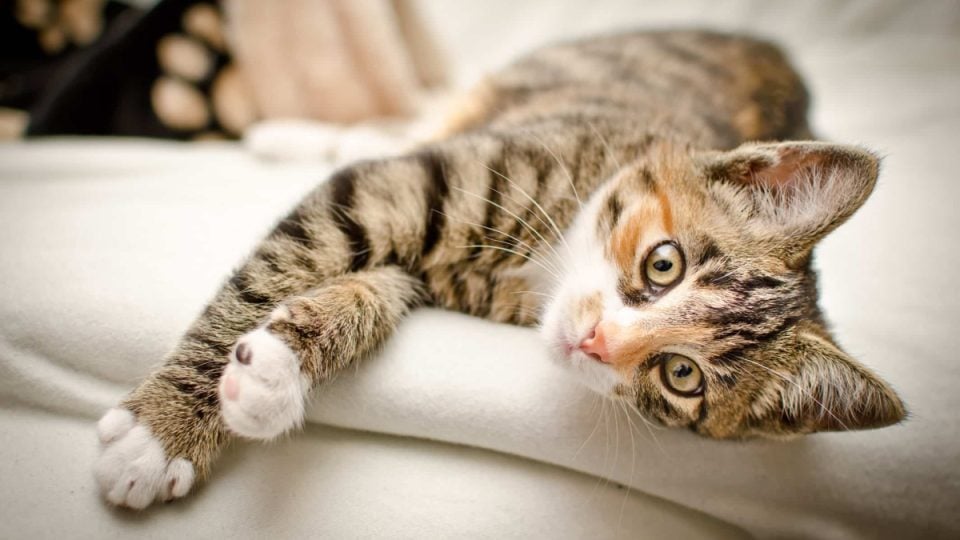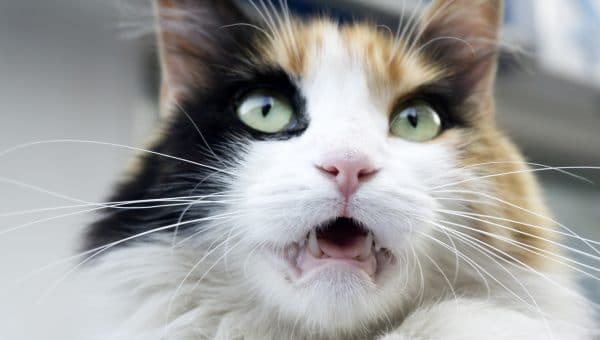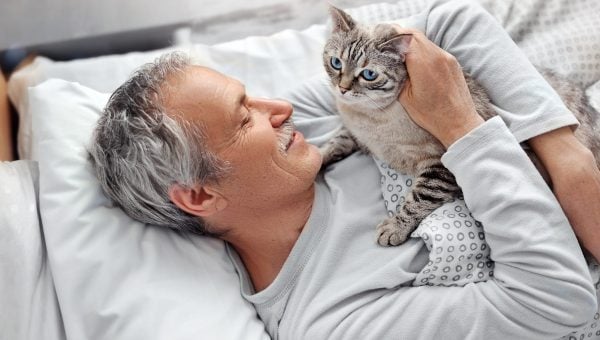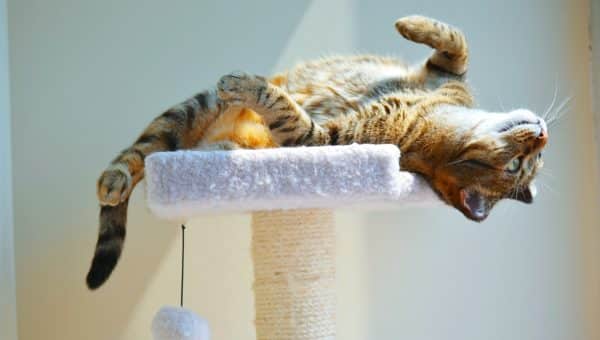- Not a substitute for professional veterinary help.
It’s perfectly normal for cats to shake their heads from time to time. But if your cat has been shaking their head more than usual and can’t seem to stop, something else could be happening. And if you notice frequent head shaking alongside symptoms like dizziness, vomiting, or sensitivity to light, it’s time to call your vet.
Thankfully, the most common causes of head shaking in cats—allergies, ear infections, fleas, and ear mites—are all highly treatable. We did some digging to learn more about what causes cats to shake their heads. Here are 14 reasons your cat might be shaking their head with symptoms to look for and ways you can manage any underlying causes.
1. Ear Infection
The most common cause of head shaking in cats is an ear infection. Affected cats will often shake their heads and scratch at their ears to loosen up debris and fluid in the ear canal.
Additional symptoms of ear infections include:
- Frequent ear rubbing
- Red ears
- Swollen ears
- Ears are hot or painful
- Ears are smelly
- Waxy or black or yellowish discharge from ears
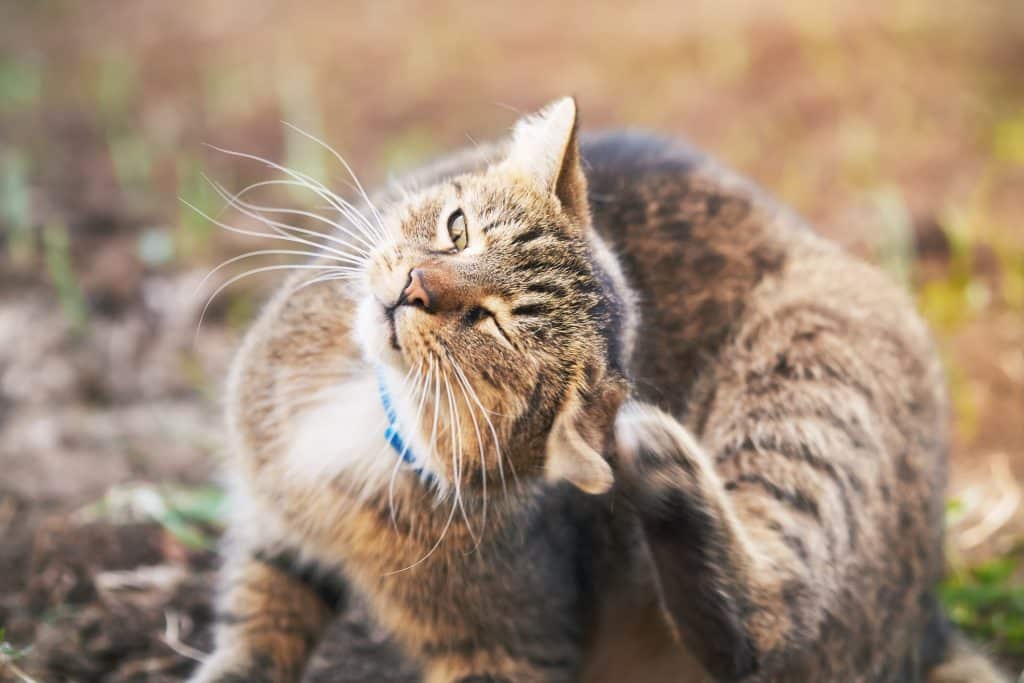
iStock/Nedim_B
Additionally, because so many facial nerves run through the middle ear, an infection in this area can cause neurologic issues like a lack of balance, drooping eyelids, and head tilting.
Diagnosing and treating an ear infection is pretty straightforward. First, your veterinarian will examine your cat’s ears to ensure the eardrum is intact. From there, they’ll prescribe a round of antibiotics to drop into your cat’s ears with instructions on keeping them clean. More severe cases may use oral treatment instead. The good news is most cats respond well to treatment and will usually recover fully within two weeks.
2. Allergies
If your cat is shaking her head and sneezing, allergies could be to blame. Like humans, cats can be allergic to flea bites, certain foods, or airborne irritants like pollen or dust. Pruritis (or itchiness) is the primary side effect of allergies in cats, which causes constant scratching, biting, and head shaking.
Additional symptoms of allergies in cats include:
- Coughing
- Sneezing
- Wheezing
- Nasal or eye discharge
- Vomiting
- Diarrhea
The best way to avoid flare-ups is to help your kitty avoid whatever triggers their allergies. This can include using flea prevention, washing bedding regularly, providing a healthy diet, and keeping your home as dust-free as possible.
In many cases, vet-prescribed topical lotions or ear drops are enough to control the inflammation caused by allergies. Your vet may also prescribe cortisone pills to control the itch and antihistamines.
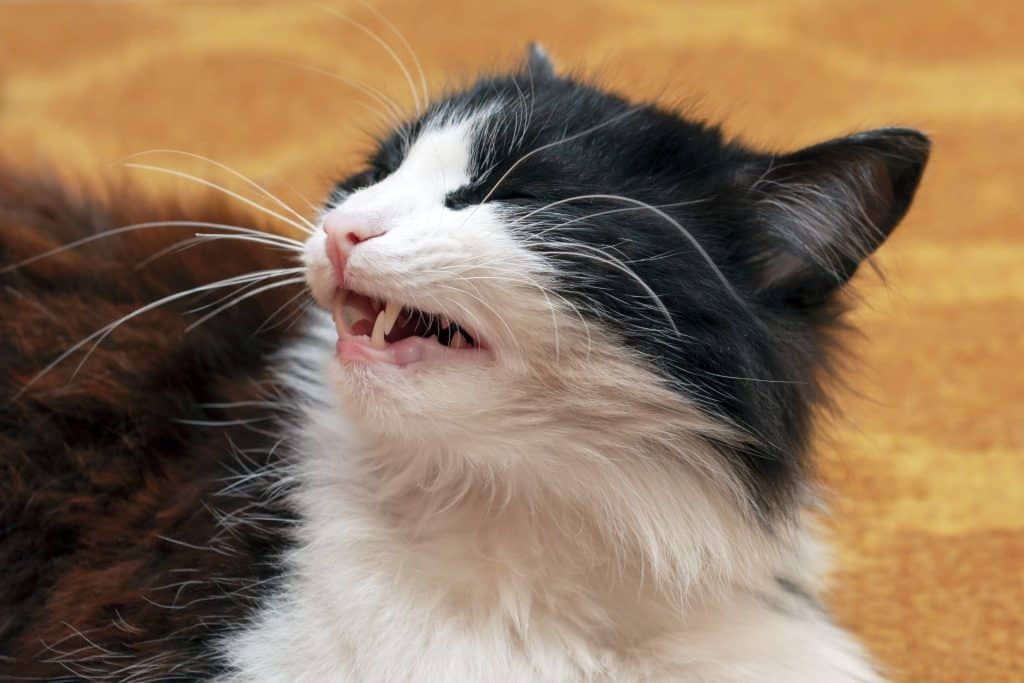
iStock/Lyubov Kulikova
3. Ear Mites
They are minuscule yet pesky parasites that most commonly affect kittens and outdoor cats. Ear mites cause significant discomfort, and cats often shake their heads and paw at their ears to remove the offending irritants.
Additional symptoms of cat ear mites include:
- The outer ear is inflamed
- Incessant scratching
- Ears are held flat against the head
- Hot ears
- Black debris
- Bad-smelling earwax buildup
If your cat’s symptoms suggest ear mites, you should see your vet immediately. Ear mites are very contagious and won’t go away without treatment. Early intervention will alleviate your cat’s discomfort and can prevent infection. Treatment is very effective and usually begins with thoroughly cleaning your cat’s ears to remove wax and debris. Next, your vet can recommend a topical, oral, or systemic course of medication that will take around three weeks to complete (although your cat should feel better much sooner).
4. Ear Polyps
Polyps are small tissue growths that can develop in a cat’s ear (or nose or mouth) and may lead to head shaking. While ear polyps are benign, problems can occur if they’re not removed and continue to grow into the ear canal or the back of the throat. If they travel into the ear canal, they can interfere with a cat’s balance—hence the head tilting and shaking.
Additional symptoms of feline inflammatory polyps include:
- Scratching at the ears
- Ear discharge
- Loss of balance
- A drooping eyelid
- Unusual eye movement
- Different pupil sizes
- Suppose a polyp grows down the eustachian tube, which connects the middle ear to the throat. In that case, you’ll notice respiratory symptoms like sneezing, nasal discharge, reverse sneezing, snoring, difficulty swallowing, and noisy, labored breathing.
Polyps are most commonly seen in kittens or young cats. Treatment involves surgical removal. Your vet may also follow up with an anti-inflammatory, such as prednisone, to lower the risk of recurrence.
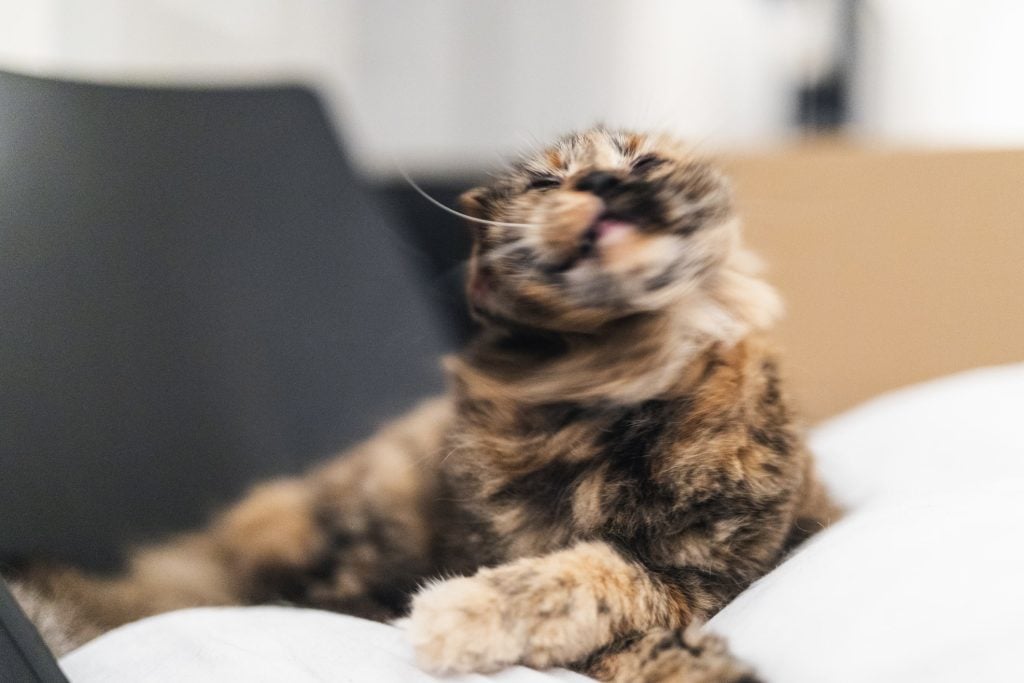
iStock/piranka
5. Insect Bites
Many insects, including mosquitos and black flies, carry toxins in their saliva. So when your unfortunate cat suffers a bite or sting, it may cause a localized reaction that involves head shaking.
Additional symptoms of insect bites include:
- Swelling and inflammation at the site of the bite
- Lesions or small bumps on the tips of ears
- Itching
- Hives
Your vet will prescribe antihistamines or steroids to treat the inflammation caused by a bite.
6. Respiratory Infection
If your cat is shaking their head and sneezing repeatedly, it could mean they have a respiratory infection. Kittens are especially prone to respiratory diseases because of their underdeveloped immune systems. Shelter cats, outdoor cats, and flat-faced breeds like Persians also face a higher risk.
Additional symptoms of an upper respiratory infection include:
- Sneezing
- Coughing
- Nasal discharge
- Runny, watery eyes
- A hoarse meow
- Fever
- Loss of appetite
- Ulcers in the nose or mouth
Typically, a mild infection can be treated at home with prescribed eye ointments or oral meds. Antibiotics may also be prescribed to prevent complications from secondary bacterial infections that can occur. More severe cases may require a combination of antibiotics, antivirals, and IV fluids to restore hydration.
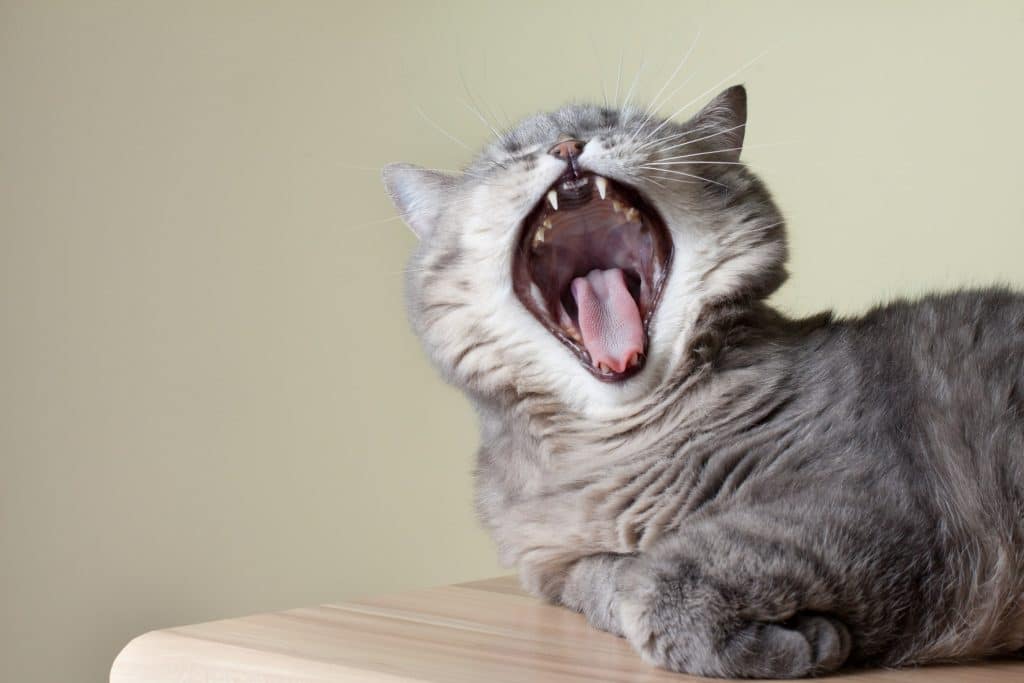
iStock/BrAt_PiKaChU
7. Oral Problems
If your cat is drooling while shaking her head, she could be experiencing dental issues, like inflamed gums or gingivitis. Because this makes it difficult to chew, many affected cats will tilt or shake their head strangely while eating.
Additional signs of dental issues in cats include:
- Swelling and redness of gums
- Pain and bleeding around the gum line
- Teeth-grinding
- Reluctance to eat
If you notice any combination of these symptoms, your veterinarian can complete an oral examination to look for irregularities along the lips, gums, and oral cavity. They can also check for plaque, loose or missing teeth, or fractured teeth.
8. Foreign Bodies in the Ear
Sometimes cats shake their heads quickly when they have something lodged in the ear, like a seed or a blade of grass. In these cases, you’ll also notice your cat pawing or scratching at their ear.
Suppose cat parents find themselves in this predicament. In that case, Dr. Ernie Ward, DVM, the Veterinary Medical Lead at Basepaws, offers this simple guideline: “If you can see the object, grasp it, and remove it without causing much pain to your cat, then do it,” he advises. However, if the object is causing bleeding or pain, or if you can’t see or get a hold of it, Dr. Ward recommends letting your vet take it from there.
“Many cases require pain medication and sedation to remove the offending object,” Ward points out. “Remember that violent head shaking is meant to dislodge the foreign body, so if your cat can’t shake it loose quickly, chances are he may need a vet’s skilled hands and instruments to get the job done,” he says.
If there is any skin damage, your vet may also prescribe an antibiotic for any potential secondary infections.
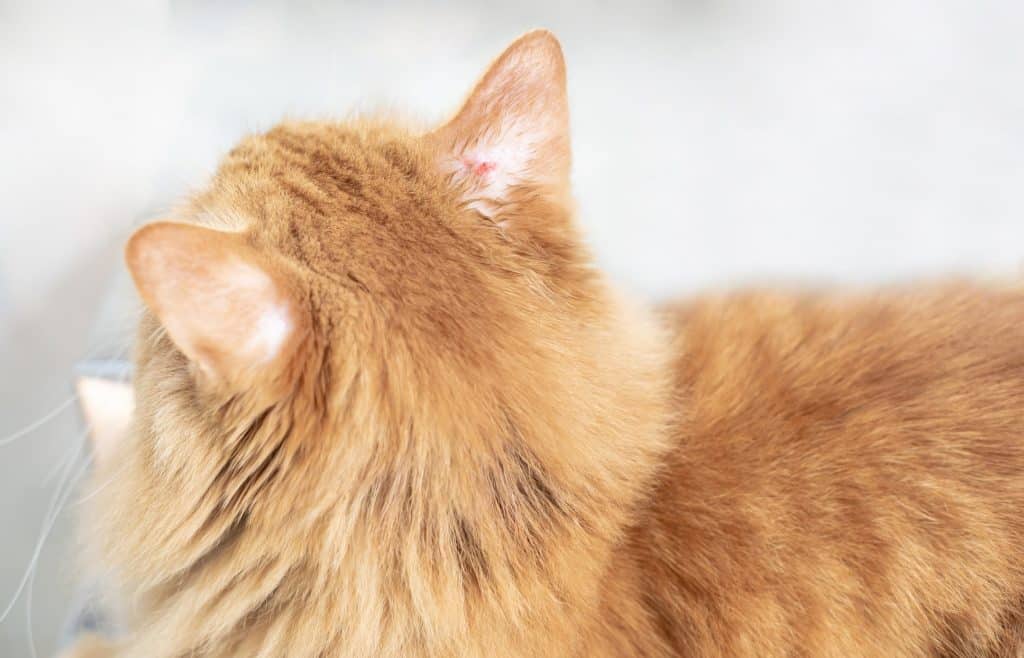
iStock/NongAsimo
9. Ear Injury
Trauma to the ear is another cause of head shaking in cats. Most of the time, ear injuries happen after a violent tussle with another cat. Sometimes, wounds from these bites or scratches can lead to an abscess, followed by head shaking.
Cats who go outside may also encounter prickly briars, burrs, and underbrush that poke at their fragile ears. Persistent scratching from an itchy bug bite can also damage the ears.
Additionally, Dr. Ward reminds pet parents to watch out for extreme heat and cold, which can injure delicate feline ears. Frost-bitten ear tips or ears burned from rubbing against heaters or other hot surfaces can cause painful trauma.
Additional signs of ear injury or trauma in cats can include:
- Scratching at the ear
- Scabs around the ear
- Inflammation and swelling of the ear
- Bleeding, discharge, or crusty ears
- Hair loss
To treat an ear injury, your vet will clean the cat’s wounds, using sutures (under sedation) if necessary. For an abscess, the area will be drained, followed by a script for antibiotics.
10. Aural Hematoma
Also called “pillow ear,” an aural hematoma is a pocket full of blood that develops if a blood vessel bursts inside a cat’s earflap. This can cause cats to shake their heads, Dr. Ward confirms. “Hematomas, or bleeding underneath the skin from blunt trauma, will appear as ‘bubbles’ of fluid and can cause intense headshaking in cats,” he says.
Since an aural hematoma results from ear trauma or self-inflicted wounds from pruritus, it warrants a trip to the vet so they can identify the cause of the injury. To remove the hematoma, your vet may drain it with a needle. In some cases, surgery is preferable. And depending on what they learn from the examination, your vet may also prescribe treatment for an underlying infection or mite infestation.

iStock/Evgeniya Kurilova
11. Tumors On The Pancreas
While rare, an insulinoma, or tumor on the pancreas, can lead to muscle twitching and head shaking in cats. These tumors interfere with the pancreas’s ability to function correctly, causing it to secrete excess insulin. This leads to hypoglycemia (low blood sugar)—with head shaking as one of the primary side effects.
Additional signs of an insulinoma include:
- Weakness and fatigue
- Lack of coordination
- Muscle twitching
- Changes in temperament (overstimulation and restlessness)
- Seizures can occur
- Collapse
Early diagnosis and treatment offer cats the highest chance of remission. In addition, we see the most success with surgical removal, which provides cats with a significant opportunity for survival.
12. Feline Infectious Peritonitis
One of the more severe conditions that cause head shaking and bobbing in cats is a viral infection called feline infectious peritonitis, or FIP. This disease can cause neurological problems like head shaking, imbalance, or seizures.
It’s rare for a cat who is an “only child” to get FIP, but it tends to spread throughout multiple-cat environments, such as kennels and catteries.
Additional symptoms of FIP include:
- Sneezing
- Watery eyes
- Nasal discharge
- Gastrointestinal issues
Until recently, FIP was considered incurable. But promising new antiviral drugs have become available, which may be able to help. However, these treatments have yet to be approved by the FDA, so consult a vet.
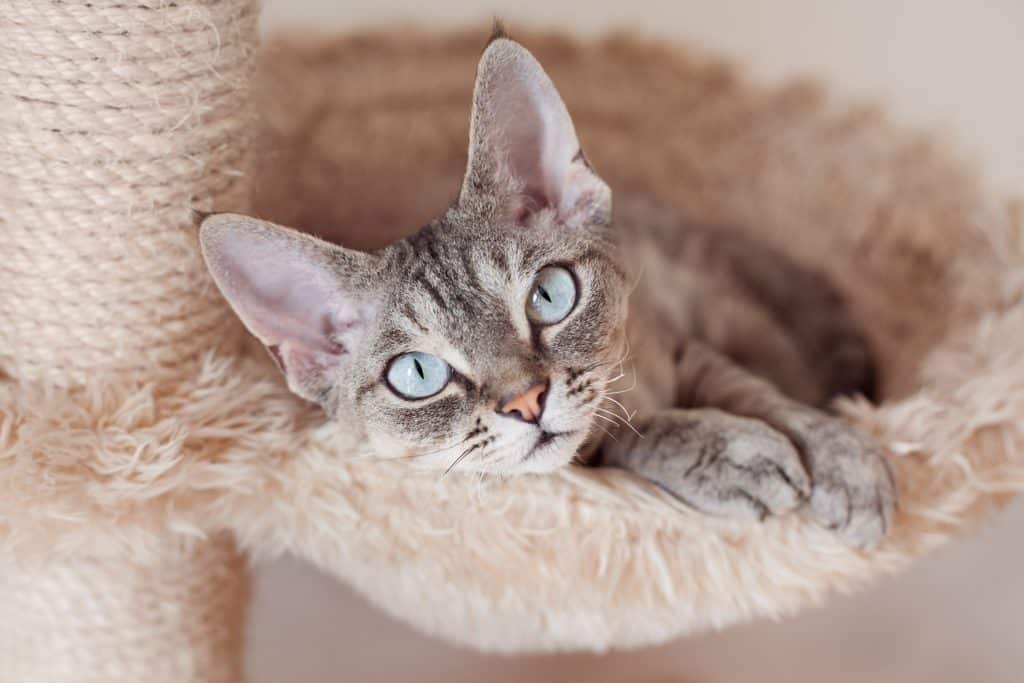
iStock/insonnia
13. Devon Rex Myopathy
Parents of the playful and rare Devon Rex may be familiar with this breed’s predisposition to a type of muscle disorder. Devon Rex Myopathy, sometimes called spasticity, can cause a cat to bob her head and carry it low.
Additional symptoms of Devon Rex Myopathy include:
- Muscle weakness
- Fatigue
- A high gait
- Megaesophagus
Because it’s a congenital condition, the disease usually appears early in a Devon Rex cat’s life, between 3 and 23 weeks of age. Unfortunately, there is no treatment for this condition beyond palliative adjustments. However, some cats may be able to adapt to posture limitations. And feeding small amounts from a raised platform can help with swallowing issues.
14. Cerebellar Hypoplasia
Also known as “wobbly cat syndrome,” this neurological condition causes erratic movements, lack of coordination, and imbalance in cats. It occurs when the cerebellum (the part of the brain responsible for motor movements and posture) fails to develop fully. No particular breed is more or less prone to developing this condition.
Fortunately, affected cats are not in pain and will learn to adapt to their condition. Although some affected kittens may be prone to minor injuries associated with falls, they can expect a happy life and an average life expectancy with some extra care.
And there’s more good news: Dr. Ward says incidences of cerebellar hypoplasia have decreased significantly since vaccines against panleukopenia virus (a common cause of the condition) were introduced in the 1960s.
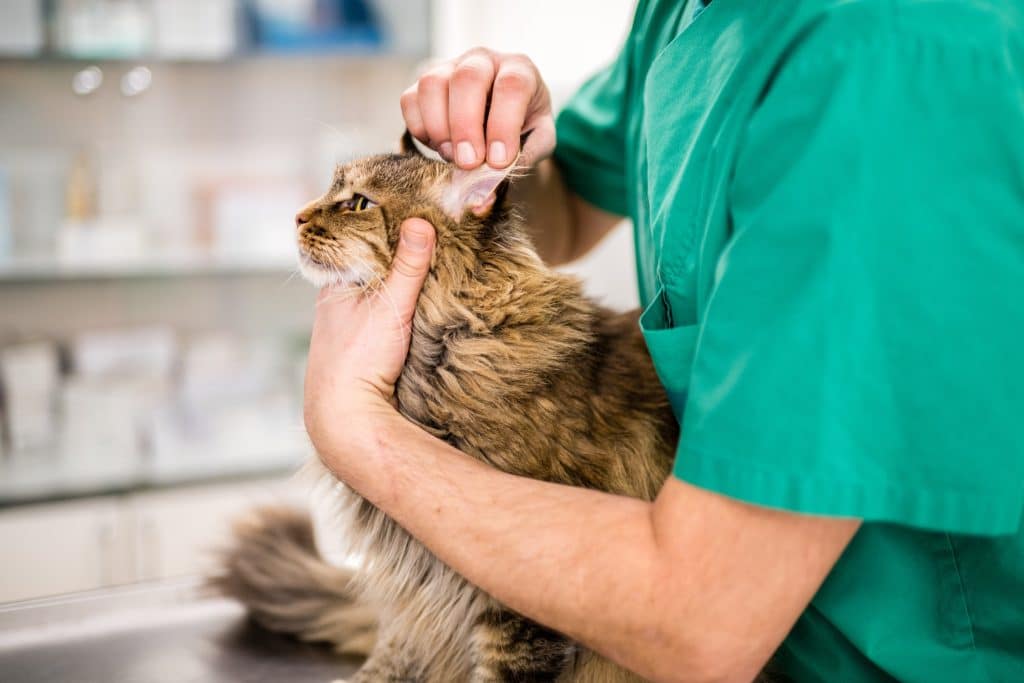
iStock/simonkr
The Bottom Line: Constant Head Shaking Warrants a Call to Your Vet
As you can see, persistent head shaking in cats is tied to several causes. And while some are more serious than others, most require some veterinary intervention. When it comes to unusual feline behaviors or symptoms (head shaking included), the best rule of thumb is: “when in doubt, ask your vet.”
